Text
Everything
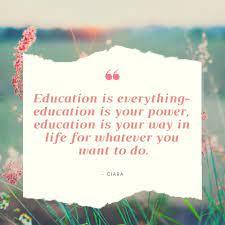
Final journal, June 9, 2022
When I googled, "what is teaching", I came up with a slue of definitions and many of them were rather general. I jotted down that teaching is:
shaping character and behaviour
attending to individuals needs, feelings, and experiences
intervening so students learn particular things
to impart wisdom and knowledge
not limit teaching to textbook knowledge (LOVE!!!!!)
a teacher is someone that helps students acquire knowledge, competence, and virtue
to make a positive impact on a student's life/academic career
Then, I feel upon this article that I read, I will share the link, it's worth the read:
After reading, I have concluded that teaching is EVERYTHING. I had never considered, "going beyond the given" as described in the article. I think I may have subconsciously, I'm not quite sure, but I like to think so. Teaching is EVERYTHING, academics, human relations, lifelong learning, introspection, careful interventions, literacy, mathematics, science, arts, technology, and SO MUCH MORE. Teaching sharing, understanding, listening, supporting, communicating, adapting, changing, improving, and I can go on and on and on ...
All I know is that I want to become a caring teacher that encourages a love for learning and help my students be confident in their future, whatever they wish, they can achieve. I want to leave that imprint!
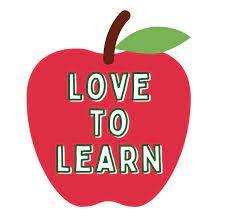
0 notes
Text
Where are you from?
June 2, 2022
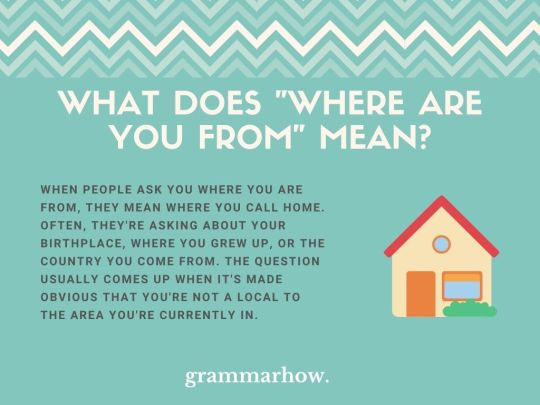
Where are you from? This is a simplistic and common question we are asked when meeting new people. How does it make you feel? When I am asked this question, I always feel that I am being assessed, as though the person asking will gather the information I share with them and make a judgement about who I am based on where I am from. Funny enough, I am certain the person asking has already made a judgement regarding my appearance. So this question is just additional knowledge about who I really am to form a more conspicuous judgement, right? I think so. It's only the tip of the iceberg. I am much more than, "Where are you from?"

During class discussion, a student mentioned that they didn't mind being asked the question because it was a gateway to evaluate the other person's authenticity. I thought that was interesting. So, I asked, "If you feel the other person is not authentic, what barrier are you creating?" Are we creating barriers by asking these kinds of questions? Sadly, I think these questions do create barriers. For example, another question I'm often asked is, "Are you English or French?" Firstly, I NEVER know what to answer. I think I identify as an Anglo because I did most of my studies in English institutions, yet raised in a bilingual household. Secondly, what does it matter? It's a question that irritates me. If I'd answer, "I'm French," would that change anything? Would the person asking suddenly perceive me differently? In a good or a bad way?

As educators, we must be mindful of the questions we are asking to better know our students. We must get to know our students beneath the surface of the iceberg because that is where true individuality lies. Students have much more to offer than where they are from, their race, what language they speak, or their sexual orientation or gender, etc. As a future teacher, I want my students to be valued for much, much, more. I want my students to be valued for being kindhearted, caring, persevering, inquiring, open-minded, accepting, confident, hopeful, and exceptional individuals that have a love for learning.
0 notes
Text
My Educational Philosophy
June 7, 2022
So, I'm almost done with EDUC260. My educational philosophy has changed since beginning the class. Actually, to be fair, my philosophy about how children learn and my approach is constantly changing as I learn more about myself, my identity, and the realities my students face. AND each students' reality is distinct and challenging at various degrees. Some students face parental abuse/neglect, others have poor social skills, some encounter rejection, others struggle with learning disabilities, or academics. Students bring a lot of baggage into the classroom.
My teaching philosophy has greatly changed as I gained experience in the classroom and also working in schools with lower SES. I have come to realize that all the challenges students face must be handled even before attempting to teach anything academic. Again, for me, this is a whole new ball game. I find myself trying to make sense of it all. For instance, once the student that has not had breakfast has had something to eat, it is time to transition into learning. Still, this student cannot transition into learning because they are disinterested and detached. I ask myself, what more does this student need? Or, is my sensitive disposition being manipulated? These sorts of situations leave me struggling as a teacher.
When asked in class to jot down my educational philosophy, this is what I wrote:
understand the basic needs, backgrounds, etc. of my students
learn about the individuals I work with: students, teachers, parents, other professionals
value the strengths of my students and projecting positivity
find balance between reality and optimism
model and demonstrate love, caring, kindness, and good behaviour
create an environment of two-way, experiential learning, and hands-on learning
allow students to reach their full potential in their own time to encourage academic achievement (be patient and encouraging), give students small, realistic, and achievable goals
reflective, constant learning, and evolution (auto-evaluation)
openness
I feel that my educational philosophy and approach to teaching will constantly evolve with learning, interactions, and insight. So, for now, this is my philosophical teaching aspiration, but not my conclusion. I will likely modify my list to improve it. I believe the purpose of education is for "the job", for human relations/interactions, for personal progress and growth and much more; education is life and a life-long process. We never stop learning.

0 notes
Text
A Destination to Learn

May 31, 2022
My reflection today is based on chapter four (and chapter eight) class readings. I was able to relate to Comenius and his idealist and utopian views about education, how grand are these ideas?!?!? COLOSSAL!!!! I was immersed in reading about how he wished to rebuild society through educational reform. As I had mentioned in a previous journal entry, undoubtedly, our educational system desperately needs an overhaul and should examine Comenius' educational ideology. Our education system, and present ideology is shaping and teaching our children to become educated to obtain a successful career and earn a living in order to be financially comfortable and survive. I mean, I am the first to sermon my own children about getting an education and to have a job that will support owning a lovely home, having a reliable means of transportation, food to eat, and whatever else they desire! The past two "pandemic" years have contributed even more to financial struggle and just surviving day-to-day; it's been a trying time! Unlike ever before, I feel the need to make more money just to survive.
I was just saying to a friend the other day, my paycheck is for filling up my vehicle with gas to go to and from work, and then what? Once I've paid everything else, there is not much left. Our capitalist society has really got us "by the balls" and we're not even making money anymore to spend in senseless consumerism. I, for one, am asking myself more serious questions when I am spending my money, like, "Do I really need another pair of leggings to add to my collection of 50?" Yes, I NEED my job (and I ALWAYS need more leggings)! I NEED to work!
Our education will help to get that job, right? Right!

I find myself in a conflicting state of mind when I think about my philosophy towards education. I want to teach this utopian Comenius vision that is based on students' interests and what they want to learn, but I also want to be realistic and survive reality. Is it even possible? I think so. I believe balance in educating our youth is definitely possible. Can a teacher educate their students about the realities of present society? Yes. Can a teacher promote individual learning and help guide learning? Yes. Can a teacher combine native and western culture into the classroom and encourage respect? Yes, why not? Can a teacher follow governmental pedagogy and teach subject matter? Yes (if they want to keep their job as a teacher). Can a teacher choose how to integrate pedagogy into their classroom and broaden learning perspectives? Absolutely. A teacher can prepare students for "universal life wisdom" as Comenius states. This universal life wisdom is finding, embracing, and adapting to reality, in my opinion. My ideal pedagogy and my ambition is to transfer this to my students. This is my teacher battle, being a realist and a dreamer. I feel that if all teachers plant a seed, a progressive, utopian education system can grow. Perhaps, one day, reality will blossom into utopia.
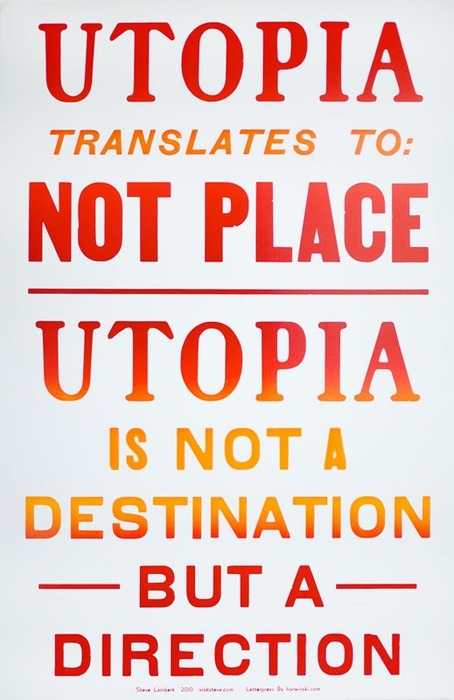
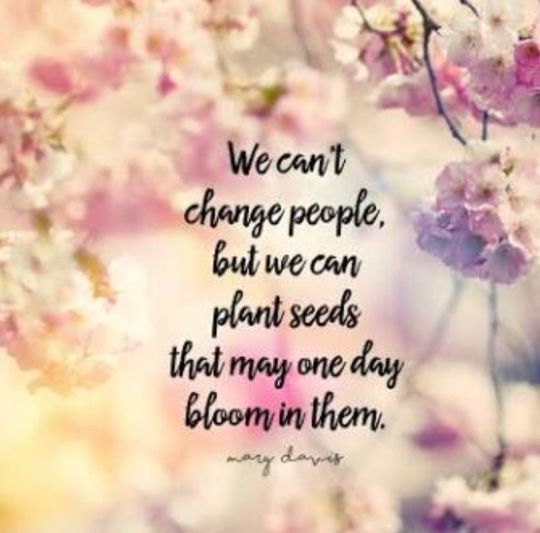
0 notes
Text
The Nature of Learning
May 26, 2022
I realized, in my college years, the value of outdoor education is huge. I studied in the Community Recreation Leadership program at Dawson College. Per program requirement, I was involved in outdoor education classes. These classes helped me to expand my horizons, appreciate nature, and truly understand my existence within it.
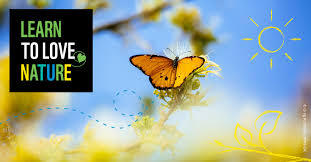
I learned to embrace each season through the outdoor education courses. I once despised the winter months, but through participating in the "Winter Outdoor Education" course, I grew to LOVE the winter months and winter has become my absolute favourite season. Why do I love the frigid cold season ever since? The aim of this intensive course was to familiarize students with the development and organization of winter recreation activities. Course content included: health and safety risks, environmental impact of activities, winter games, activities, sports, winter ecology and nature interpretation. More precisely, I learned to track animals. I learned about quinzhees and slept in one. I snow-shoed, cross country skied, skated in the forest, played ball hockey, painted a winter scene, sculpted a tree trunk out of natural clay, wrote a wintery poem, and sat quietly in the forest, just listening. I built a fire outdoors and sang with my classmates. This experience marked me and I cherish the memories, and these memories are already over twenty years ago!!! The hands-on learning is what reinforced my knowledge and enlightened the pedagogy. I walked away and maintained what I was taught and I continue to implement it in my life today.
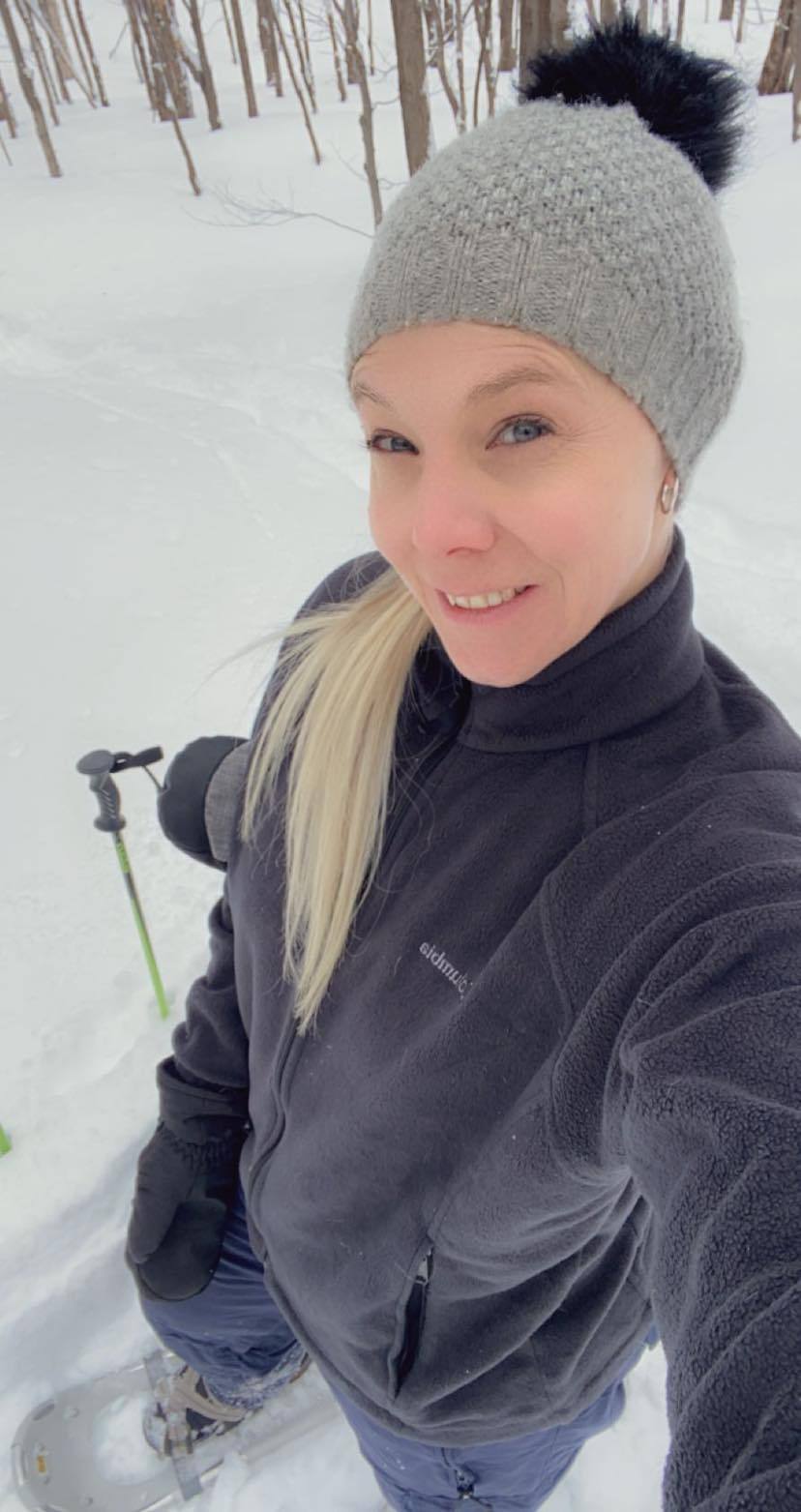
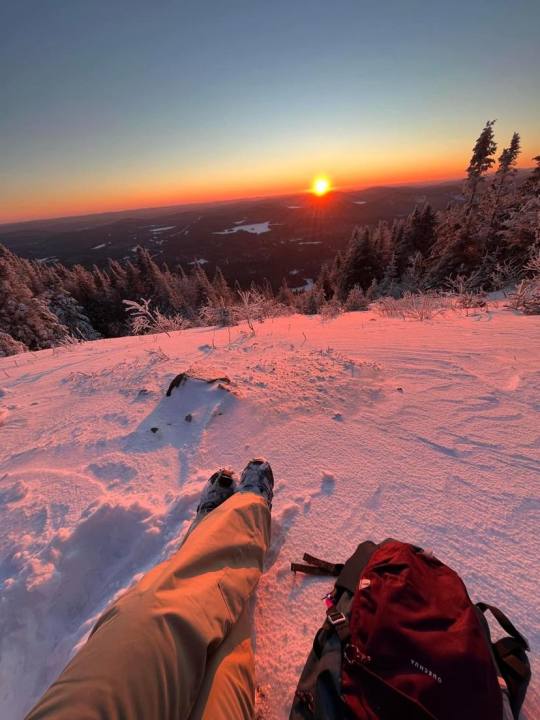

Today, I am an avid snowshoer and I adore winter hiking, especially with my dog. I have carried that nature based learning experience with me for over twenty years. Sitting in the forest, just listening that cold February morning illuminated all my senses and left an impression; I NEED that feeling of tranquility and rejuvenation more so than ever, at forty (something) years old! I find that sensation in nature. Nature offers me that opportunity.
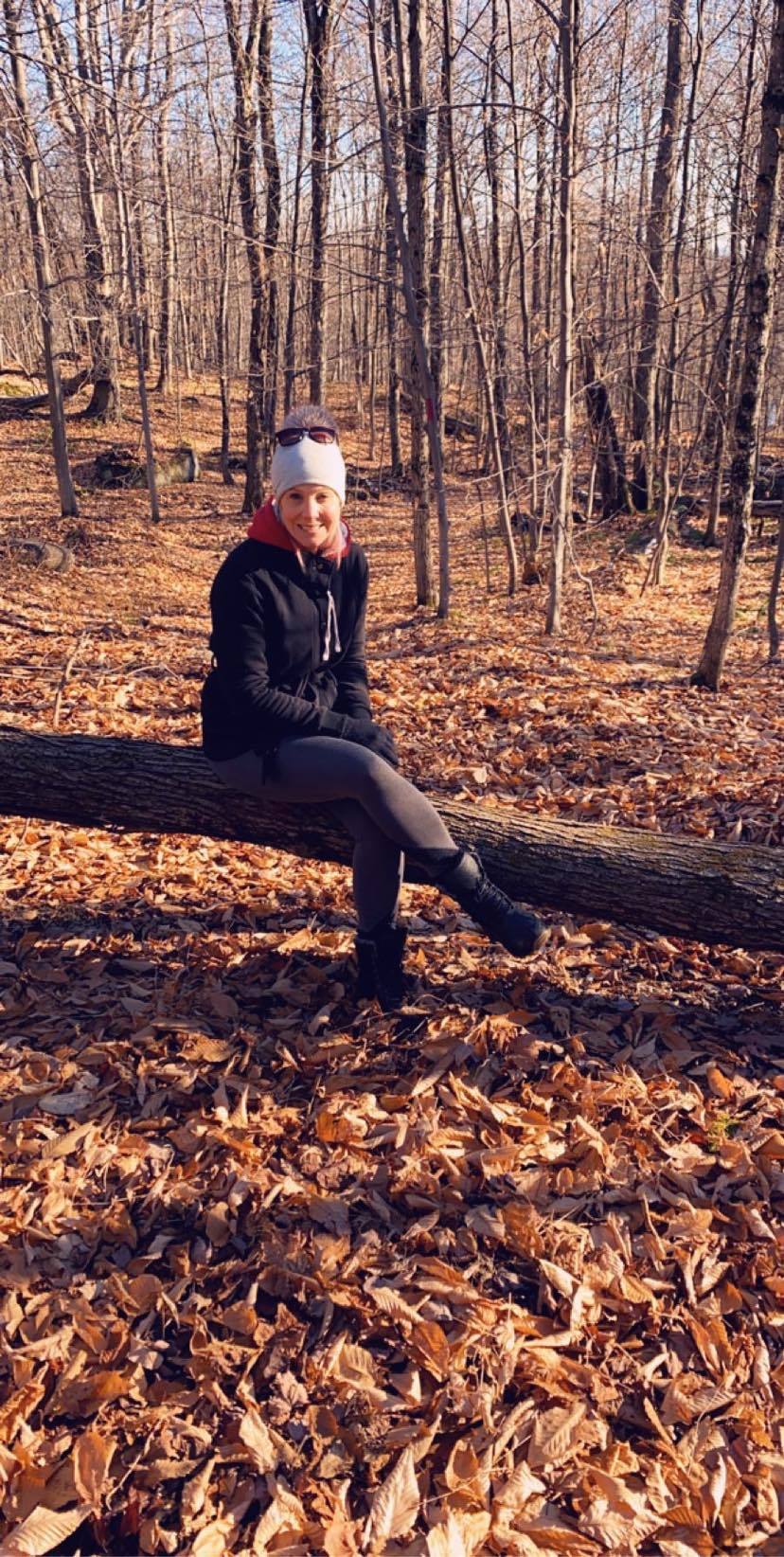
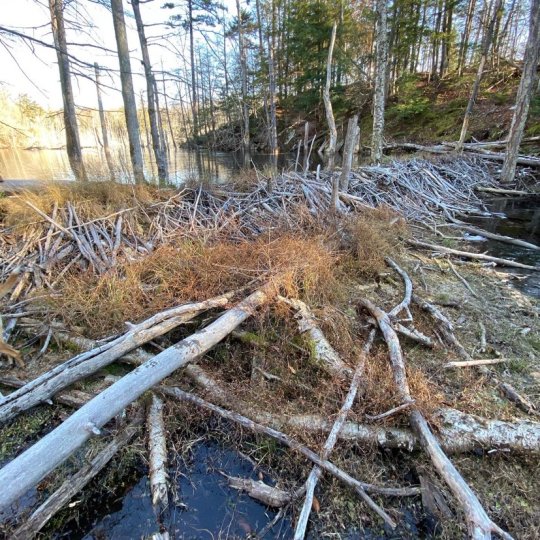
Nature allows me to understand that I need nature and nature does not need me!
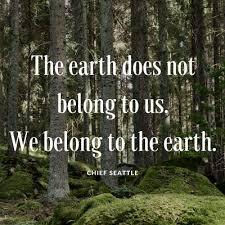
I learned during my outdoor education classes the health and safety concerns and the environmental impact of a a recreational activity. The environmental leadership course instilled in students the importance of recreation leadership in relation to the natural environment and to be aware of the links between their local actions and larger environmental issues. Students organized and lead an outdoor environmental activity that modeled the values and techniques covered in the outdoor classroom. It was truly a worthy learning experience that no textbook could possibly offer.
In my case, the activity I decided was to bring the outdoors indoors, much like what was covered in class discussion. With other classmates, I introduced a fish tank into the common area of the CRLT program. It was a way to promote caring and nurturing while encouraging a more natural indoor environment, to value the soothing and tranquility it could offer to a busy environment. The fish tank remains a feature in the department's common area.
Nature based learning is so beneficial and in so many ways. As a teacher, I would plan some kind of nature based learning experience for my students, whether it be a simple activity like worm composting in the classroom, keeping a weather journal, sketching wildlife, growing a plant in the classroom, or feeding birds in the schoolyard, just as an introductory rouse to inspire. I want my students' learning to withstand throughout their lives and that it is useful and meaningful.


0 notes
Text
Good & Bad
May 19, 2022.
I would like to continue this journal along the same notion as my previous journal and discuss more specifically, “what is a good teacher” based on chapter three and JJ Rousseau’s idea of a “good mother”. The class discussion was rather negative regarding Rousseau, but I felt differently. Rousseau had me thinking and questioning, what is a “good mother”? What defines a “good mother”? I have decided to explore this idea of “a good mother” which I feel is very subjective, but in reference to “what is a good teacher” and connecting to our course.
This idea of “a good mother” is something I have contemplated being a mother. I ask myself every other day, “Am I a good mother?” What dictates that I am good or not? I also ask myself, “Am I a good teacher? A good person overall?" I think that being a parent (mother or father) is like being a teacher in the sense that both are educating children. So, how is being good at either role evaluated? I remember one of my ECE professors that I had for an internship seminar saying to the class, “If the children know your name at the end of the first day and the children are happy to see you and hugging you the following week, that is a good indication you have formed an attachment and you’ll likely pass your internship!”
I felt that Rousseau was not “wrong” in writing, “Does the child need a mother’s care as much as her milk?” etc. I also 100% agree that there is no substitute for a mother’s love (or milk for that matter). I will explain as you read on. I disagree with, “The woman who nurses another’s child in her place is a ‘bad mother’”. No, she is not a “bad mother”. Still, there is no substitute for a mother’s love. As an ECE educator, I understand the truth in Rousseau’s statement. I was simply a pseudo mother for the children left in my care and I was not “bad” at my job, but I was no replacement for the children’s mother (or father).
Despite being in the early childhood education domain for many years, I am a strong advocate of parents’ raising their children at home before the elementary school years. I must add, I developed this opinion in my later years as an educator. I lived my ECE vocation in contention for quite a few years and it was one of many reasons I left my profession. Of course, I was grateful for my job, but revolted with the fact that family values and child rearing are undervalued and seems unimportant to parents (and the government too)! It’s paradoxical if you truly think about it. Well, I think it is! Why are people even having children, right? In my later years as an ECE educator, I began privately judging and questioning “good parenting”. I worked for many years in an infant (pouponnière) classroom. I witnessed infants as young as three months old being passed onto early childhood educators. Oftentimes I was appalled, yet in awe that parents had that much confidence to hand over their babies.
Now, I’d like to defend Rousseau (somewhat). During class discussion, many students were commenting on his parental role and “giving up” his children. Was he “bad” for doing this? Perhaps he was not. Like many parents that must return to work almost immediately after their child is welcomed to the world and hand their children over to the early childhood educator, do they have any other choice? Our society’s focus is capitalist, not familial. Does the working parent represent the “bad” parent? Does the stay-at-home parent embody the “good” parent? Again, subjective. The working parent must go to work to provide financially for their family in order to guarantee basic needs. The stay-at-home parent is creating bonds with their child that the working parent cannot, and at the same time the stay-at-home parent may not be able to financially provide all necessities. This is conflicting in determining good and bad parenting.
When I think of a good teacher, I think of the teacher that is available for students and has formed attachments, much like the stay-at-home parent, and also teaches subject matter as well as good behaviour. But, is the bad teacher the one that follows the curriculum, tests their students, and has high expectations of achievement, which prepares students for the real capitalist world? I cannot decide on good or bad parenting or teachers. I believe there is no right or wrong when it comes to education. Learning is a lifelong process and it is has much to do with a trial and error component. Personally, I am always reflecting and reevaluating myself in a variety of contexts whether it be professionally or personally. My thinking is that it is important to find balance. Human relations (attachments), academics and developing knowledge to face the world is imperative, a good teacher knows that!
Did Rousseau sending his children away constitute bad parenting? Some might say, yes. I say Rousseau did it because he felt it was for the best, much like the parent that gives up their child for adoption because they cannot provide for or give their child what is best ...
0 notes
Text
Canadian Centre for Architecture (outdoor class)
May 12, 2022
I feel my journal entry will not be very insightful, your opinion. My day began on quite an emotional tone (but that is a whole other “novel” entry, hahaha). My mind wasn’t sharp and perceptive, or university geared. I wanted to feel slightly “smart”, logical, ecological, and efficient, so I went to Carrefour Laval, which was on my route downtown, to return an overzealous purchase. Now, somewhat smarter, with a slightly more plentiful wallet and attempting to be positive, I made my way downtown. I reveled in the gorgeous weather, the warm sunshine, and upbeat music with my sunroof open. Before class, I walked from Mackay onto Ste-Catherine looking for a place to eat lunch but was uninspired. I turned down St-Mathieu towards René-Levesque and my mother called asking if I would visit and spend an overnight on the weekend to celebrate my birthday. I strolled along René Levesque and spoke with her about what we could eat and if I’d be bringing the kids and my dog until I reached Bishop Street. Our conversation was inconclusive, and I told her I’d confirm Friday night. It’s so difficult for me to commit to things and make plans beforehand because I’ve resorted to day-to-day based on my emotional state and energy. I continued walking contemplating what I wanted for lunch. I absorbed the downtown atmosphere while enjoying the present moment. By the time I got to Place du Canada, I remembered the boulangerie “La Première Moisson” in Central Station and the “Californian” salad I absolutely love! So, I went there for lunch. Of course, when I arrived, the salad I love so much was consumed; I arrived just after the frantic corporate lunch hour. My emotional state darkened once more, and I ended up eating another salad that was merely “okay” and a fruit salad that was ridiculously overpriced. My mood resumed, hopeless, and I walked back towards Concordia.
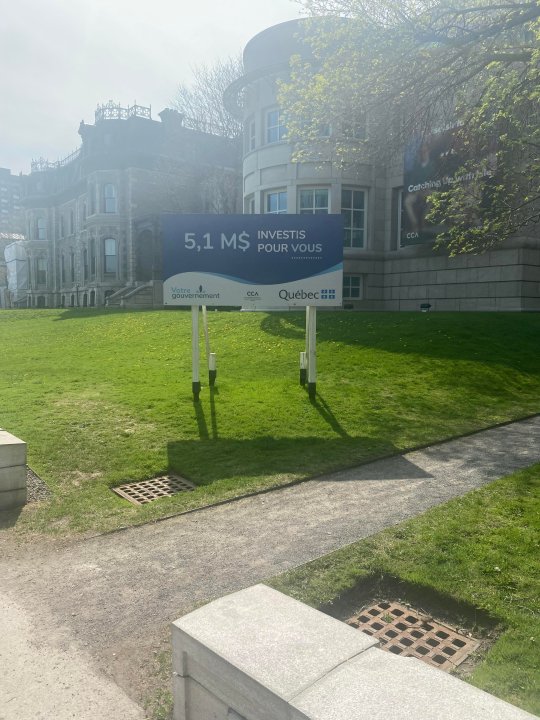
I was not motivated to walk around the park since I had just galivanted around downtown prior to class. I wasn’t in a discovery mindset. I decided to sit and look from afar. The exhibit on the fence aroused my interest, so I did get up and walked over to look. I read the quotes (right to left). I also took pictures of quotes that I felt were powerful, captivating, thought-provoking or simply amusing. Then, I started thinking, should I have read the quotes left to, right? Was there an order to these quotes or a message? I didn’t reflect much more about it and returned to sit under the tree where I had been sitting. I noticed the huge poster on the back of the CCA building and noted the website. I typed the website (cca.qc.ca) into my cellphone and began browsing.

I began reading the overview section and really appreciated the quote by Phyllis Lambert, “We’re not a museum that puts things out and says, ‘This is architecture.’ We try to make people think.” Well, the fence exhibit clearly was reflective of that quote!
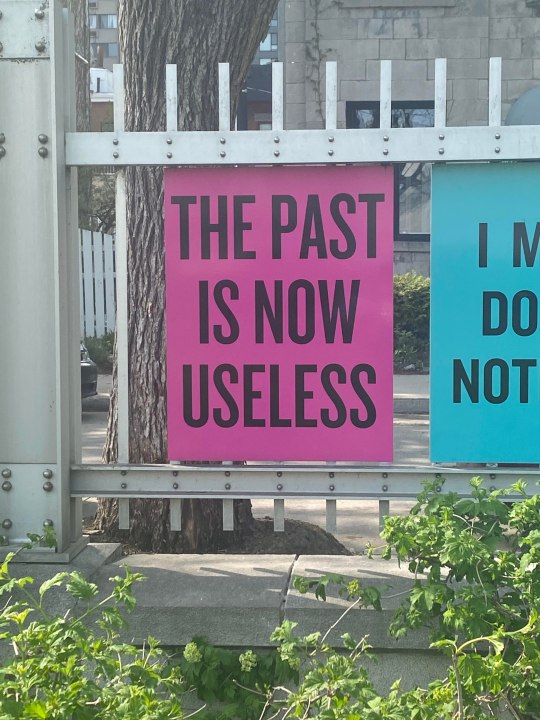
I had another “ah-ha” moment while going through the CCA website. I read about Shaughnessy House, which was built in 1874, a 19th century mansion. It is listed as a National Historic Site of Canada and a Historical Monument of Québec. I understood the association with Shaughnessy Village when I check the weather on my Météo Média app! I was quite proud of myself and making that connection!
Lastly, I would like to share something I thought admirable. On Sunday (my birthday), I attended church with my mother. At the beginning of the sermon, the minister shared with the church and those attending via Zoom this slide:

I was surprised by the coincidence of my learning in this class and that the church also prayed for the reconciliation about the land of the Indigenous people.
0 notes
Text
Our past, Our present, Our Future
May 10, 2022

My journal’s focus is about quotes that I jotted down and seriously got me thinking about my job as a teacher. The idea of “educators are more than information transmitters” really got me thinking about my role as a teacher. I began supply teaching towards the end of 2019 without much experience other than eight years as a daycare educator and a few years in municipal recreation. I began a certificate course at UQAT, “L’accompagnement à l’enseignement primaire” because that’s just how I roll, and I wanted to acquire knowledge to be the best possible supply teacher. I feel that as a supply teacher, I just regurgitate to the students whatever is provided on the lesson plan. Does it sometimes go against my own views about how children should learn and how they should learn? I can say, yes! For instance, coming from an early childhood background, I was taught that an art lesson should be open-ended without much educator influence. Have I been in a position that compromised this perspective? Yes! I have taught an art lesson with instructions and a product outcome that was not open-ended whatsoever. So, this tiny anecdote is to express my new founded concern … have educators simply been transmitting information to students without insight or exactitude, and as a result Indigenous and minority groups have been suffering for decades? Really?
If educators are more than information transmitters, then, our education system should be exceptional. Conversely, our education system is in peril; it is an open wound. After listening in class and discussing the historical events leading up to the present day, it is safe to say that much of our educational system has ignored acceptance and integration of culture, language, and has disrespected basic rights. Automatically I thought, “The government’s fallacy! Of course! That is unquestionably the problem, everything that is problematic is the government’s fault!” Now, this leads me to another quote I made note of, “Why is curricula not written by front line educators?” Interesting. This question needs to be acknowledged and examined by the government. Québec’s educational system should be transitioning to a major reform, I believe, anyway, let’s get with the present time, right? Let’s dissect the past, mend the open wound instead of just temporarily putting a Band-Aid on it. Why is our educational system so perilous and how do we correct it? It goes waaaaaaaaaay back.

0 notes
Text
Individual Culture; More than Curriculum
May 5, 2022.
So, I must write a modern-day journal, a blog, much to my dismay. I have seen online blogs and I have never taken interest in reading online. I am what the younger university students refer to as “old school” or should I say, “mom”. I mean, I will be 42 years old in a few days. I am practically their mother! I absolutely prefer the flow of pen to paper rather than the clickity-click of the keyboard and I appreciate tidy penmanship too. I one hundred percent favour an actual book than struggle with the luminosity of a screen, which blurs my vision and in turn gives me a headache. But that’s just me! Since beginning university last fall, I have had to step out of my comfort zone many times and “get with the times”. Still, “getting with the times” is such a laborious task and I need to conform to doing things in a certain way. As a future teacher, I imagine that there will be times that I will have to conform to things, like a curriculum that is not suited or adapted to help all the students in my classroom in reaching their full potential.
As I reflect upon class readings and discussions, I understand that the education system I grew up in was not inclusive or sensitive to all groups of the population. I have lots of questions, especially, “What are we learning? Is our education system’s sole purpose academic achievement? Should fundamental human relations be prioritized to improve educational culture? Should the system consider its approaches and the impact it has on individuals and their unique learning experiences? Should the government manage incorporating various learning approaches and learning culture or should that be the discretion of only the teacher?” I believe the answer to my questions is, YES! Oh! What are we learning? Of course, the answer cannot be, yes. We are learning for our future career, to join the workforce and to be a contributing member of society; this has been my standpoint and opinion about education since I began studying in the field since 2020.
As a qualified early childhood educator, I have seen the benefits of integrating individual culture into my classroom. One of the first things I learned as an educator was to create a secure attachment with the children I care for (and their parents). After all, it’s about working with human beings on a day-to-day basis. For my part, I aspire to create a bond that is harmonious to better my work experience and that of my client. In a classroom, our students (and parents) are our clients and what we are offering, specifically to the students, is their education. Consequently, my intention is to guide students to their full learning potential. It is a proven fact that students that feel accepted will develop an interest and desire to learn. Acknowledging a student’s culture can undeniably create a more secure and comfortable learning environment.
For example, I recall a time in my prekindergarten classroom that a child did not eat with utensils. Another child was shaming and ridiculing the child for not using their utensils. It was an awkward situation. As an educator, I had to intervene and explain that some cultures do not use utensils for eating and that it was allowed. I decided to ponder about that unique situation and design a unit on cultural food activities. This unit encouraged understanding, advocated inclusion, boosted confidence, and prepared the children for a broader sense of community as they would be heading to elementary school.
I seized an awkward situation and made it into a rich learning experience. I was proud of myself for raising awareness among my students and creating a more accepting and understanding atmosphere. I approached the situation this way because this emulates my own personal values. I value human beings, acceptance, and inclusion. The situation had nothing to do with curriculum but much more to do with a group of children (a small society) and recognizing individuals within a group. When interpreting the bigger picture, the learning went beyond the curriculum and taught an important lesson about moral consciousness, right behaviours, and ultimately, respect. Again, what is education, simply academic achievement? For my part, I believe that education is much more than test scores. Education is much like Vygotsky’s social and cultural theory. Teachers are constantly educating by making connections through social interactions with their students. It is time to truly think about this and begin cultivating, valuing, and employing individual culture into learning.
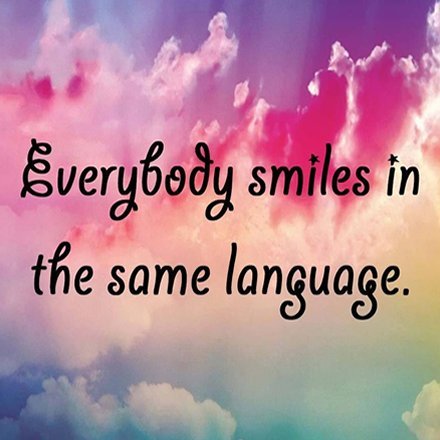
0 notes
Text
Empty vessels & Industrialized Education
May 17, 2022.
I felt the tone at the beginning of class was rather “mordant” and the class discussion “piquant” or maybe enthusiastic? I’m not quite sure how to describe it. I just know that I was feeling a bit uneasy and not super motivated thereon. Personally, I thought it was an unexpected commencement to class.
As discussion developed, I faced conflict, confusion, anxiety, and felt totally ignorant. I realized that I am not so well-informed about the topics we were discussing, such as, capitalism, communism, feudalism, Marxism etc. I realized how I could not fully take part in the discussion because I know very little about the topics. I could not position myself and have a possible viewpoint. I listened, tried to follow the discussion, and make sense of what was being discussed while relating it to the questions associated to the readings. I was completely in awe with students that seemed to be so knowledgeable about the topics and shared their ideas and opinions. This made me think about another discussion brought up more towards the beginning of class and how students are not just empty vessels, and that learning is not simply a one-way flow of information (something I highlighted in chapter 9, wink, wink). However, I do defend my idea, which I had brought up in class. Some students are empty vessels and need to be filled with information. I was the empty vessel student in class … voilà! I think it is important to consider that as a teacher. Some students may not be so knowledgeable about certain class topics and refrain from participating. While students may not seem to be fully engaged in what is happening in the classroom, they might be feeling overwhelmed and are simply processing information. As a teacher, it is essential to understand students’ individual abilities and offer support and guidance if they sense a student might be struggling and feeling overwhelmed. I know, I have appreciated teachers that have sensed when I was having difficulty. Oftentimes, students do not ask for help although the teacher has proposed aid. When I am substitute teaching, I tread gently with students that get easily overwhelmed and frustrated when they are not grasping a certain concept. I approach them with a gentle hand on their back, like, “I’m here, I got you,” and I offer my support. I encourage them and ask them, “How can I help you?”
This brings me to my next thought about something I took note of during class, “the industrialized education system”. This was a discussion in class that I found interesting and veritable. By listening to the class discussion, I got the sense that some students felt that the industrial revolution did not have a positive impact on society. Of course, there are always positive and negative connotations to anything. The industrial revolution was important because it changed society. The population became more educated because new skills were needed for more sophisticated work. There was advancement and development in that regard too (food, housing, education, etc.). Wealth increased for society overall. On the other hand, education during the industrial revolution was geared to forming workers in an impersonal, efficient, and standardized way. It also created two classes of society, middle class (those that owned and operated factories or businesses) and the working class (oftentimes exploited by their middle-class superior). The industrialized education system was to foster work and obedient students entering the workforce. Is this still true today? I contemplate the question and consider it to be true. I wrote a reflective essay in one of my first university classes at UQAT about what I believe my role is as a teacher, this was my conclusion:
Bien que la profession soit intimidante par moment et remplie de tâches sans fin qui semblent parfois insurmontables, elle est aussi gratifiante. Participer à l’éducation d’un enfant, le voir réussir, non seulement dans les matières, mais en tant qu’être humain est le plus satisfaisant. La profession d’enseignante est une indication de l’avenir. C’est donc une grande responsabilité de réveiller l’intérêt d’apprendre, soutenir et encourager les enfants car ils deviendront nos professionnels dans toutes les professions!
I suppose that I have an industrialized way of viewing my profession. Still, is it completely incorrect or bad? Isn’t there some truth to educating students as future professionals and contributing members of society? This is the world we are living in, or am I naive?

So, I am concluding this journal with newfound internal conflict and confusion about my profession and what information, knowledge, and value I am sharing with students I encounter. Am I a contributing member to the “industrialized education system”? Now, what can I do as a future professional to make headway in this “old” 19th century system? I probably need to consider my identity as a teacher in a different way to stray from this industrialized 19th century mindset. The learning curve of education fascinates me more and more in addition to reshaping my approach to teaching. Still, when I enter a classroom, I revert to “what I need to get done curriculum-wise” and I sometimes forget what I believe is important to teach. Oftentimes, I teach PreK, Kindergarten and Cycle 1 students and what I believe is important to teach is socialization among peers and proper and inclusive behaviours. In my opinion, ABCs and 123s are secondary educational goals at this age. I just need to remind myself what I believe is important and what I regard as educational value for my students. At the same time, I cannot ignore the curriculum. As a teacher, it is vital to find balance between teaching curriculum and educating students about the richness of universal culture and morality.
0 notes